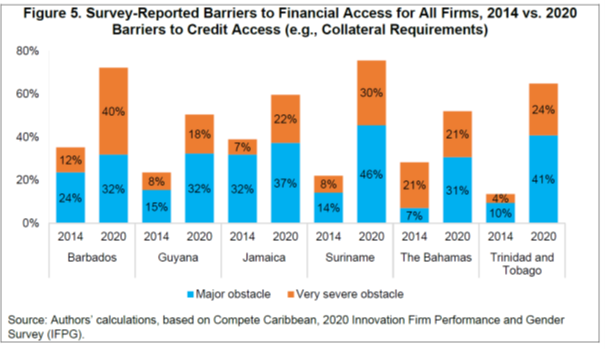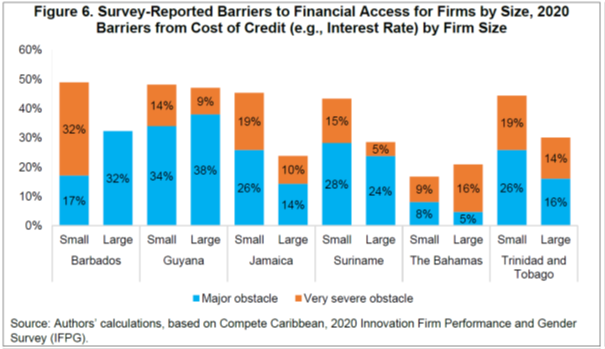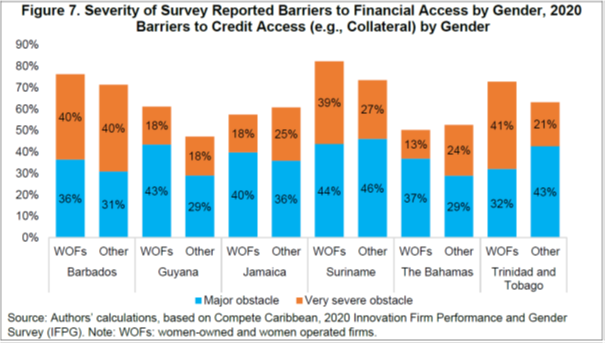A new report from the Inter-American Development Bank (IDB) and IDB Invest recommends Caribbean countries focus on overcoming obstacles to financial access and inclusion for businesses, because having more developed and inclusive financial systems could increase growth and reduce poverty and income inequality.
The report Finance for Firms: Options for Improving Access and Inclusion emphasizes the important link between deeper and more accessible financial systems, and faster and more inclusive economic development. The publication compares financial systems of six Caribbean countries—The Bahamas, Barbados, Guyana, Jamaica, Suriname, and Trinidad and Tobago—to others from across the world. It also assesses results of enterprise surveys in 2014 and 2020 to identify key financing challenges faced by firms, including small enterprises, and those that are owned or operated by women.
The report finds that firms across the Caribbean face outsized challenges, particularly when compared to global peers. It also finds that the COVID-19 crisis appears to have further constrained access to financing, that smaller firms seem to face more significant hurdles than larger ones, and that businesses owned and/or operated by women face more severe challenges than others. These challenges companies encounter include high borrowing costs, burdensome collateral requirements, inadequate funding mechanisms, and complex application procedures.
In 2020, 76% of firms in Suriname and 72% of firms Barbados reported that issues such as significant collateral requirements posed major or very severe obstacles to their performance and ability to do business, up from 22% and 35%, respectively, in 2014.

Meanwhile, in 2020, small firms in five of the six economies surveyed reported high financing costs as a more significant barrier to business than larger firms.

Surveys also suggest that women-owned or -operated firms (WOFs) face more significant financial constraints than other firms, with an average of about two-thirds of these enterprises reporting access to financing as a major or severe obstacle.

“It is key for the public and private sector in Caribbean countries to collaborate so entrepreneurs can better finance their ambitions to grow their businesses,” said David Rosenblatt, Regional Economic Advisor for the IDB’s Caribbean Department. “This is important for strengthening the ongoing economic recovery, in the near-term, and improving growth prospects for the future.
The authors proposed several priorities, including ensuring macroeconomic stability and policy prudence, improving the availability of credit information, and promoting credit sector competition, among others.
Finance for Firms: Options for Improving Access and Inclusion is part of the IDB’s Caribbean Economics Quarterly series. In addition, it has country-specific sections for The Bahamas, Barbados, Guyana, Jamaica Suriname, Trinidad and Tobago.
This report is in line with the SMEs, gender and inclusion pillars of Vision 2025 – Reinvesting in the Americas, the IDB’s roadmap to economic recovery and inclusive growth in Latin America and the Caribbean.
About the IDB
The Inter-American Development Bank is devoted to improving lives. Established in 1959, the IDB is a leading source of long-term financing for economic, social, and institutional development in Latin America and the Caribbean. The IDB also conducts cutting-edge research and provides policy advice, technical assistance, and training to public and private sector clients throughout the region.
About IDB Invest
IDB Invest is a multilateral development bank committed to promoting the economic development of its member countries in Latin America and the Caribbean through the private sector. IDB Invest finances sustainable companies and projects to achieve financial results and maximize economic, social, and environmental development in the region. With a portfolio of $14.8 billion in asset management and 376 clients in 25 countries, IDB Invest provides innovative financial solutions and advisory services that meet the needs of its clients in a variety of industries.
Golda Lee Bruce
